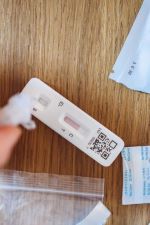These simple steps can protect you, your loved ones, and your community during flu season.

By Dr. Stella George, Chief Medical Officer, Cigna International Markets
With flu season already underway in many parts of the world, the continuation of COVID-19, and concerns about a myriad of other illnesses such as monkeypox, it’s important that we protect ourselves and those in our communities from the viruses that cause these illnesses. We can all take simple steps to limit the spread of germs and illness, and keep others well.
 Knowing how viruses spread can help us minimize the risk. Illnesses such as COVID-19, flu, and the common cold can easily spread through coughing, sneezing, talking, or just by touching surfaces that have the virus on them. Other illnesses such as monkeypox spread through close contact, including direct skin-to-skin contact or by touching objects, fabrics, and surfaces that have been used by someone with the illness.
Knowing how viruses spread can help us minimize the risk. Illnesses such as COVID-19, flu, and the common cold can easily spread through coughing, sneezing, talking, or just by touching surfaces that have the virus on them. Other illnesses such as monkeypox spread through close contact, including direct skin-to-skin contact or by touching objects, fabrics, and surfaces that have been used by someone with the illness.
It’s simple to reduce your risk of getting sick by choosing to receive preventative vaccines and practicing good hygiene. Steps you can take include:
- Staying at home when you are feeling unwell or sick and avoiding close contact with others who are sick.
- Washing your hands often with soap and water for at least 20 seconds or using an alcohol-based hand sanitizer.
- Covering your nose and mouth with a tissue when you cough or sneeze, then throwing it away.
- Wearing a mask in crowded or poorly ventilated areas.
To help you stay healthy and maintain a strong immune system to fight infection, be sure to also:
- Prioritize an active, healthy lifestyle with a balanced diet and plenty of sleep.
- Focus on your mental well-being, and incorporate self-care practices into your daily routine.
- Stay hydrated by drinking water and other fluids.
Seek Medical Advice When Unwell
Viruses such as the flu can cause mild symptoms, including a fever, headache, fatigue, chills, cough, nasal congestion, sore throat, and body aches, as well as more serious complications. Most people can recover without needing an in-person medical visit, treating the illness with rest, increased fluid intake, and over-the-counter medications to help relieve symptoms. If you feel unwell, contact your health care provider or use virtual care services to seek advice and support.
At this time of year especially, please look after yourselves and help protect your community from the spread of illness.

The 411 on At-Home COVID-19 Tests
In addition to issues accessing tests, the accuracy of home tests is often questioned – along with how to select the best tests, how to use them, and when to use them. In this article, we answer some of the most common questions about at-home testing and more.